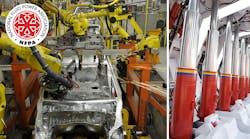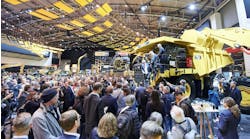The National Fluid Power Association will hold its quarterly conference on Dec. 2, and it will be presented as a live, interactive webinar to prevent the spread of COVID-19. The show’s organizers will broadcast the conference to attendees online using the Remo Online Conference Platform.
The theme of the conference is “Advanced Technologies for Eco-Friendly Fluid Power Systems,” which is supported by the three presentations scheduled for the event, which runs from 8:00 a.m. to 11:40 a.m. (EST).
The presentations include:
- “Sustainability & Manufacturing,” given by Chris Bortnik; VP of engineering at Schroeder Industries, LLC. He will discuss ways of making high-horsepower, off-highway equipment and high-volume industrial fluid systems more carbon neutral while letting users maintain profits. Some of the solutions include reducing the volume of fluid used in systems, and reducing or eliminating how frequently companies dispose of used fluids.
- “4 techniques to achieve Eco-Friendly Fluid Power System Designs for Industrial Machinery,” given by Neal Gigliotti, an application engineering manager at Bosch Rexroth Corp. His talk will give attendees insights into using conventional fluid power technologies and new engineering techniques to increase efficiencies, reduce noise and use less oil when cooling requirements allow it.
- “Electronification of Mobile Equipment – Impact and Opportunities on the Fluid Power Industry” will be delivered by Marty Christianson, market manager for E-Mobility/AE Cooling Systems at Hydac Corp. He will outline the challenges and opportunities possible when companies replace the internal combustion engines in construction and off-highway equipment with battery/fuel cell power. This is timely in that the trend toward electrification has been growing in the auto industry for over 10 years and is now gaining momentum in the mobile/off highway equipment segment, which uses a significant number of fluid-power components.
The presentation will address the effect on hydraulic circuits when the internal combustion engine and its limitation are removed. It will also look at the challenges most companies will encounter as the hydraulics become lighter and more efficient, and how newer technologies such as battery cooling, hydrogen filtration and pressure sensing can be used to overcome these challenges.
There will be 20-min. breaks between presentations, which will give attendees time to meet and network with other attendees at “virtual tables.” The Remo platform lets attendees move from virtual table to table to see and talk to others “at” the conference.
To learn more about the conference and to register for it, visit this site.

